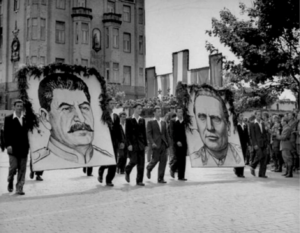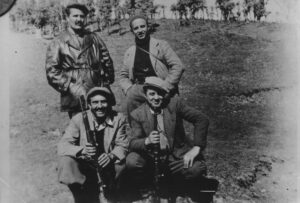
The Satellite Gone Rogue
The leadership of the Yugoslav Communist Party is carrying out a policy unfriendly toward the Soviet Union and to the All-Union Communist Party. In Yugoslavia an unworthy policy of belittling Soviet military experts and discrediting the Soviet Army has been permitted. Soviet civilian specialists in Yugoslavia have been subjected to a special regime, on the basis of which they were put under the surveillance of State security organs and subjected to shadowing. The representative of the All-Union Communist Party (Bolsheviks) at the Information Bureau, Comrade Yudin, and a number of official representatives of the Soviet Union in Yugoslavia, were subjected to the same shadowing and supervision on the part of the State security organs of Yugoslavia.
All these and similar facts prove that the leaders of the Yugoslav Communist Party have taken up an attitude unworthy of Communists, on the basis of which the Yugoslav leaders began to identify the foreign policy of the USSR with the foreign policy of the imperialist powers and behaved towards the Soviet Union in the same manner as toward the bourgeois states. Precisely as a consequence of that anti-Soviet attitude, slanderous propaganda – borrowed from the arsenal of counter-revolutionary Trotskyism – on the degeneration of the All-Union Communist Party, on the degeneration of the Soviet Union and so on has become current in the Central Committee of the Communist Party of Yugoslavia. — COMINFORM statement in 30 June issue of the Daily Worker
Long pointed to as a turning point in the history of the Cold War, the Tito-Stalin split was not a shocking spur-of-the-moment event, but rather a long simmering eruption that gained its momentum in January through March 1948.
As Europe signed onto the Marshall Plan, the Soviet Union felt assailed on several fronts. It was this action by the west that provoked the later intense Stalinization programs that gutted the native leadership of Eastern Bloc countries.

But one country that was not open to a Moscow-led purge was Yugoslavia, although they possessed ironclad communist credentials as self-made communists. The Yugoslavs had fought hard and bravely in World War II, with oft-promised Soviet help only materializing significantly after 1944. Their victories gave them a sense of national pride, overriding the bellicose tendencies of the Balkan nations against each other as they joined under the banner of Partizan achievement.
As such, when Moscow started deriding the Yugoslav victories and attempting to take over the Yugoslav army with infiltrators, they were met with stiff resistance. Although Tito considered Albania to be a part of a unified Yugoslavia (the Yugoslavs had formed the Communist Party of Albania during the war, and even in 1947 were responsible for nearly 57% of the Albanian budget), Stalin’s need to crack down on Eastern European nations in the face of an ambitious West caused him to flip 180 degrees and remove Albania from the Yugoslav sphere of influence.

When the Communist Party of Yugoslavia banned passing any information on to Soviet advisors about the Yugoslav economy on 9 March 1948, the die was cast. Within the week Soviet advisors were pulled out of Belgrade, citing the feeling of working in “enemy territory.”
Tito responded with a letter to Stalin calling the “enemy territory” claims ridiculous, and on 27 March Stalin responded with a letter accusing Tito of being “anti-Marxist”, unequivocal communist-speak for “traitor”.
The split was nearly official. The Marshall Plan in Europe triggered Stalinization, which triggered a need to remove all Eastern European independent leaders, which caused Tito to refuse Soviet demands, which caused Stalin to expel Yugoslavia from the Cominform, which led to the creation of the Third World and the Non-Aligned Movement.
To read about the Tito-Stalin Split, please click here.
To read about Albania’s post World War II dictator, Enver Hoxha, please click here.
- March 15, 2021
- History

